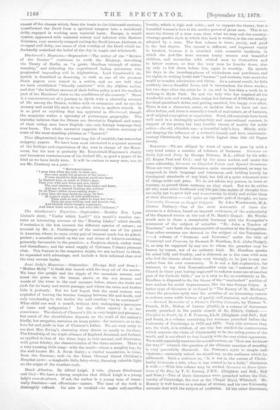Maud Atherton. By Alfred Leigh. 2 vols. (James Blackwood and
Co.)—We have a strong suspicion that Alfred Leigh is a young lady's nam•deplume. If not, the author is a young man of essen- tially feminine—not effeminate—nature. The tone of the book is thoroughly refined. Its aim is twofold—to make self-sacrifice lovable, which is high and noble ; and to support the theory, that tr beautiful woman's love is the motive-power of groat men. This is no more the theory of a true man, than what we may call the country-
vicarage-garden style iu which this book is written, is the one usually. adopted by a man. The first volume is tame, pretty, and good
to the last degree. The second is different, and improves vastly in interest, because it is crowded with romantic incidents, in which the god-like hero rescues lovely women and beautiful children, and reconciles wild, wicked anon to themselves and to better courses, so that the very men he knocks down, rise up only to fall down before him again ha worship. He spends.
his days in the breeding-places of wickedness and pestilence, and his nights in writing books and "loaders " and reviews, that move the world to wonder, admiration and virtue. As a natural result, he falls suddenly into a dreadful fever, and is unconscious for three weeks ; but two days after the crisis ho is up, and in less than a week he is walking in Hyde Park. Ho and the lady who has inspired all his' wonderful acts and words, then resign her fortune of £105,000, to pay
her dead guardian's debts, and getting married, live happy ever after.. There is not a character, scene, or incident that we have not met often before, and there is scarcely a touch of real nature, or of humour, or of original conception or expression. Good, old materials have been well used in a thoroughly perfunctory and conventional manner, in'
support of the pretty but very humble theory of motive for noble action—the old, chivalric ono—a beautiful lady's love. Sorely, with- out denying the influence of a woman's beauty and love, nineteenth- century Christianity has risen a little higher than this old Pagan. theory.


































 Previous page
Previous page